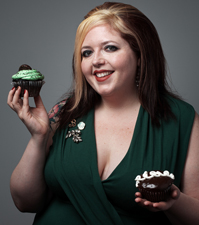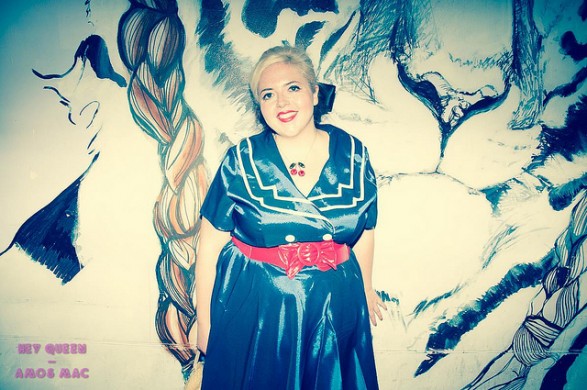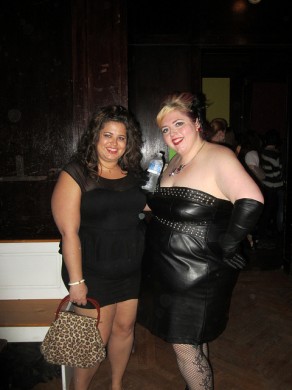 BY BEVIN BRANLANDINGHAM
BY BEVIN BRANLANDINGHAM
QueerFatFemme
Our culture normalizes talking about bodies all the time. There is especially a lot of value placed on weight gain or loss. Turn on a television and just listen to diet chatter. It’s pervasive, obnoxious and well-meaning individuals perpetuate it in our personal lives all the time.
I like to create an environment in my life that is about substance over small talk, where compliments are genuine and weight is value-neutral.
“Oh, but Bevin,” you may be saying. “I really mean it as a compliment when I notice you’ve lost weight!”
But, well-intentioned friend, just because you’re well-intentioned doesn’t mean what you say doesn’t have a harmful impact. Weight loss doesn’t mean I look good. I believe I look good at all of my weights–all bodies are good bodies. And I know your perception of me might have changed because you are socialized to believe smaller is better, but I would like to gently invite you to do something different with your nonpliments of “You look so good!” when someone has lost weight.
It’s also important to remember that the well-intentioned friends come in all shapes and sizes, fat, thin and in between.

(Photo by Amos Mac)
1. How about don’t talk about it?
I strongly subscribe to the philosophy that my body is nobody’s business but my own. If I want to talk about it with someone, I will and I do.
I completely understand the inclination to ask questions about an obvious change. I am a naturally inquisitive person. My friends call me the Queer Oprah because of my tendency to really like to get into the meat of people’s stories. As I’ve learned how to become a more sensitive and compassionate person I have had to learn that sometimes you just don’t ask and you stay in the dark. It feels kind of impossible to not be nosy about it but I do it anyway because it’s not my business.
Also, what if you’re wrong? A friend of mine just said she gets asked all the time if she lost weight when she puts her hair down!
Being nosy and being inquisitive are natural things that I am still working on curtailing. But I think it’s worth it to do the work to be sensitive because I don’t want to hurt people’s feelings. I want my friends to feel like they can be their most vibrant and awesome selves around me.
2. Wait for the person to bring it up.
Have you ever noticed that lots of straight people will out themselves to you within about ten minutes of conversation? Sometimes as short as two. Straight people in a heteropatriarchy are reaffirmed all the time about how great, normal and important their straightness is. Therefore, they have likely not had the experience of having to hide or code their sexuality to people. They don’t really play the “pronoun” game and affirm their heterosexuality without thinking about it.
The same is true for lots of people who have lost weight. In a diet-obsessed culture, it is super normalized that weight loss is a good thing. People who are excited about their weight-loss will probably bring it up because it is normalized to talk about people’s bodies whether that is right or wrong. So let it happen if it will organically.
People don’t stop to think about whether or not weight loss might be a sign of someone’s increased health or not. I know many people who have had cancer that lost a lot of weight rapidly. Candye Kane (an amazing blues singer) said on stage once, “I don’t recommend the cancer diet.”
Maybe just ask them what’s going on in their life and talk to them organically. The core questions you have about them may just come to light. But, again, their body is none of your business unless they bring it up.
If they do bring up their weight loss in a positive manner, you can do the work of someone working in solidarity with fat people by saying, “I think you look great at any weight, but I’m really glad you feel good in your body right now.”
3. Mention a general compliment that is more neutral.
If you really want to compliment someone because you genuinely think they look good, there are lots of things about someone’s appearance you can go for. Instead of mentioning weight loss thing, if you want to compliment someone you can go for something else. “Your hair looks great!” “I love this outfit!” There are a bunch of different ways to express positivity to someone that don’t take into account weight loss and reinforce that weight loss is the only way to look good.
I can see friends who come at me when I’ve lost weight sort of looking for a way to talk about my appearance without going down the wrong road because they know I loved myself X number of pounds ago and they don’t want to bury themselves in the wrong kind of compliment.
4. “You seem particularly present tonight. I don’t know what it is, but you just seem extra YOU today. I love it!”
If you must say something to the person, I suggest the foregoing. Kris Ford gave me this quote.
I think it’s really great! What a remarkable way to get to the essence of what your weight loss compliment is really about. When we stop to think about what we really mean when we’re talking to people we might be able to clearly communicate without hurting them.
5. Absolutely don’t ask someone what they’re doing.
Omigod, my family is so into this discussion. I zone out when I start to hear diet talk, Weight Watchers, walking the track, whatever new thing they’re doing. I truly believe in health at every size and will totally pipe into discussions of fitness, feeling good in your body and other things from an all bodies are good bodies perspective. But I have heard “What are you doing??” question so many times and I just absolutely hate it.
Again, often folks will offer it if they want to. But in general the “what you’re doing” question is such a standard thing people think is okay to ask but it’s actually really personal! I have a super close friend I asked this question of because I genuinely had no idea how she had lost weight and wondered. But I’m close enough to her that when she dropped that it was an eating disorder it was a safe(r) space to talk about it. I also learned from that moment to tread even a little more lightly with that stuff, to open those kinds of conversations with gentle warnings or open slowly. Because people who are just hanging out or going about their life maybe don’t want to just talk about their traumas out of the blue because you want to comment on their bodies.

Super cute picture of me and Sarah Jenny from the Yes Ma’am archives.
I struggle with what to say to people when they comment about changes to my weight. True fact about me–I tend to be an emotional non-eater. If I am going through a rough time I will likely lose some weight. I lost sixty pounds when my fiance left me and every time someone commented on my weight I would say, “Bad break-up.” I would kind of grumpily respond to a nonpliment with snark.
I don’t always want to do that, but I really leave it up to how I am feeling in that moment. Sometimes I go with, “I think I look great at any size.” Often, especially if it is a friend or loved one, I go with a very long explanation of what lead to my recent weight loss so that they understand what I’m going through, that it’s been a real struggle and that the weight loss is a byproduct of a larger initiative to resolve a chronic condition I have.
Sometimes, I just respond to weight loss nonpliments graciously because it’s not worth the fight. I learned to respond to compliments I didn’t agree with back when I was still self-hating. I would do things like respond to compliments with, “Oh, I don’t look good I still have x,y,z wrong with me.” And I replaced that with a simple, “Thank you,” until I was ready to really hear and absorb good things about myself.
A friend told me once, “Hi skinny,” in response to weight loss. My response was, “Um, I don’t identify as skinny.” Because anytime I’ve ever lost weight in my life (as someone who has a lifetime of fat experience) I have always been fat.
And, in the case of my beloved Grandmother, I accept her compliments graciously and deeply appreciate when my mom pipes in with, “But we love you at any size.” Because sometimes it’s not worth the fight. But it is amazing to have my mom acting in solidarity with my politics and values around all bodies being good bodies at any size. This was not always the case, but working with her in love, respect and compassion through the last twelve years of my participation in body liberation activism, has actually been really rewarding.
Originally published by QueerFatFemme.com
Bevin Branlandingham is your femmecee at QueerFatFemme where she chronicles the relentless pursuit of her joy






